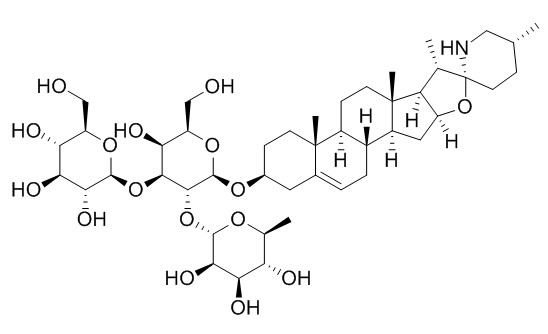Solasonine
Solasonine displays leishmanicidal activity against promastigote forms of L. amazonensis.
Inquire / Order:
manager@chemfaces.com
Technical Inquiries:
service@chemfaces.com
Tel:
+86-27-84237783
Fax:
+86-27-84254680
Address:
1 Building, No. 83, CheCheng Rd., Wuhan Economic and Technological Development Zone, Wuhan, Hubei 430056, PRC
Providing storage is as stated on the product vial and the vial is kept tightly sealed, the product can be stored for up to
24 months(2-8C).
Wherever possible, you should prepare and use solutions on the same day. However, if you need to make up stock solutions in advance, we recommend that you store the solution as aliquots in tightly sealed vials at -20C. Generally, these will be useable for up to two weeks. Before use, and prior to opening the vial we recommend that you allow your product to equilibrate to room temperature for at least 1 hour.
Need more advice on solubility, usage and handling? Please email to: service@chemfaces.com
The packaging of the product may have turned upside down during transportation, resulting in the natural compounds adhering to the neck or cap of the vial. take the vial out of its packaging and gently shake to let the compounds fall to the bottom of the vial. for liquid products, centrifuge at 200-500 RPM to gather the liquid at the bottom of the vial. try to avoid loss or contamination during handling.
Food Chem.2019, 275:746-753
Front Cell Infect Microbiol.2018, 8:292
Industrial Crops and Products2018, 353-362
LWT2021, 147:111620.
Tumour Biol.2015, 36(12):9385-93
Mol Nutr Food Res.2024, 68(20):e2400414.
Biol Pharm Bull.2018, 41(1):65-72
Molecules.2023, 28(19):6767.
Biosci Rep.2020, 40(8):BSR20201219.
J Nat Med.2020, 74(1):65-75
Related and Featured Products
Phytochemistry. 1994 Nov;37(4):1007-11.
Interactions between the glycoalkaloids solasonine and solamargine in relation to inhibition of fungal growth.[Pubmed:
7765652]
Inhibition of mycelium development in Phoma medicaginis and Rhizoctonia solani by solamargine and Solasonine generally increased with increasing pH. P. medicaginis was the more susceptible species and solamargine the more potent compound.
METHODS AND RESULTS:
Solasonine was inactive against R. solani over the tested pH range (5-8).
Dose-response curves confirmed these differential effects.
Solamargine caused 50% growth inhibition in P. medicaginis at 60 microM (at pH 7) whereas no other treatment achieved this effect at 100 microM. Combinations of 50 microM of each glycoalkaloid produced synergistic effects against both fungi, especially R. solani which was essentially unaffected by either compound, by significantly inhibited by a 1:1 mixture of the two. The magnitude of the synergism was not affected by a pH change between 6 and 7. Spore germination in Alternaria brassicicola was markedly inhibited by 100 microM solamargine but unaffected by 100 microM Solasonine or either compound at 50 microM. In P. medicaginis, neither glycoalkaloid was inhibitory up to 150 microM.
CONCLUSIONS:
In combination, the two compounds caused synergistic effects in both species, but to a much greater extent in A. brassicicola.
Food Chem . 2013 Nov 15;141(2):1181-6.
Purification, antitumor activity in vitro of steroidal glycoalkaloids from black nightshade (Solanum nigrum L.)[Pubmed:
23790901]
Abstract
Six steroidal glycoalkaloids (1-6) were isolated and purified from Solanum nigrum L. (SNL) by acid extraction and alkaline precipitation, various chromatographic techniques, and their structures were elucidated by spectroscopic data. Antitumor activity, structure-activity and its molecular mechanism were investigated by methyl thiazolyl tetrazolium (MTT) method, flow cytometry, colorimetric assay and an immunocytochemical method. Experimental results showed that compounds 1 (Solasonine), 2 (β1-Solasonine), 3 (solamargine) and 6 (solanigroside P) have cytotoxicity to MGC-803 cells. Compounds with three sugar units and a-l-rhamnopyranose at C-2 or a hydroxyl group on the steroidal backbone may be potential candidates for the treatment of gastric cancer. The mechanism of action may be related to the decrease of mutation p53, the increase of the ratio of Bax to Bcl-2 and the activation of caspase-3 to induce apoptosis.
Chem Biodivers. 2013 Apr;10(4):642-8.
In vitro leishmanicidal and cytotoxic activities of the glycoalkaloids from Solanum lycocarpum (Solanaceae) fruits.[Pubmed:
23576350]
Leishmaniasis is an infection caused by a protozoan parasite of the genus Leishmania and is the second most prevalent parasitic protozoal disease after malaria in the world.
METHODS AND RESULTS:
We report the in vitro leishmanicidal activity on promastigote forms of Leishmania amazonensis and cytotoxicity, using LLCMK2 cells, of the glycoalkaloids from the fruits of Solanum lycocarpum, determined by colorimetric methods. The alkaloidic extract was obtained by acid-base extraction; solamargine and Solasonine were isolated by silica-gel chromatography, followed by reversed-phase HPLC final purification. The alkaloidic extract, solamargine, Solasonine, as well as the equimolar mixture of the glycoalkaloids solamargine and Solasonine displayed leishmanicidal activity against promastigote forms of L. amazonensis, whereas the aglycone solasodine was inactive. After 24 and 72 h of incubation, most of the samples showed lower cytotoxicities (IC50 6.5 to 124 μM) as compared to leishmanicidal activity (IC50 1.1 to 23.6 μM). The equimolar mixture solamargine/Solasonine was the most active with an IC50 value of 1.1 μM, after 72 h. Likewise, solamargine was the most active after 24 h with an IC50 value of 14.4 μM, both in comparison with the positive control amphotericin B.



